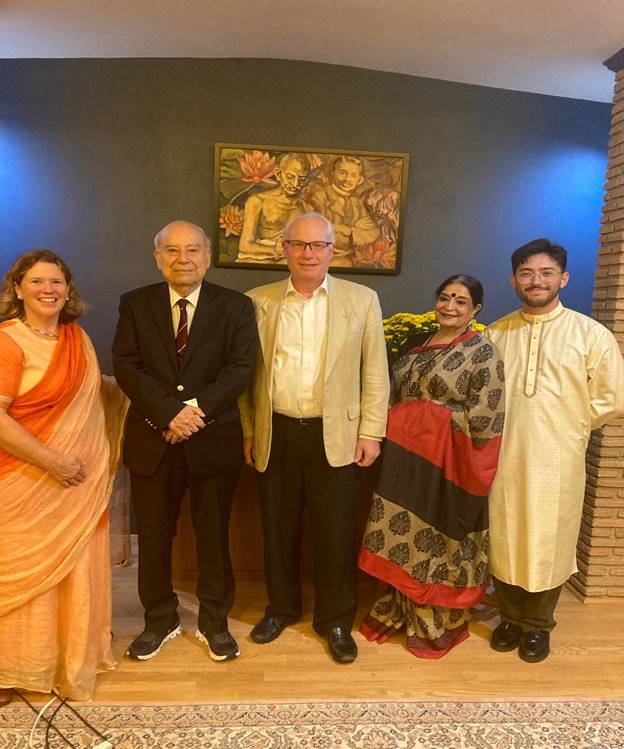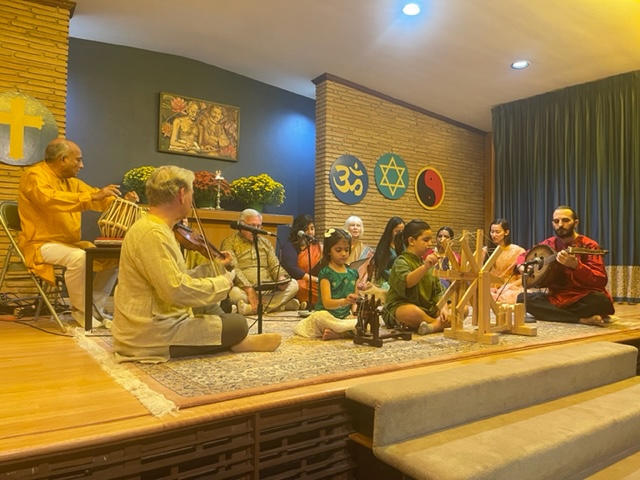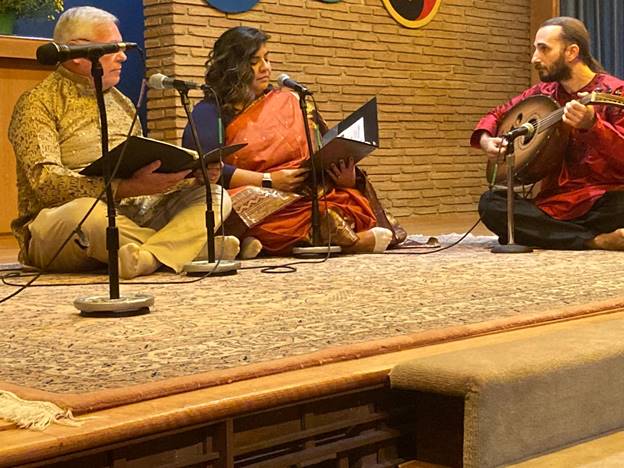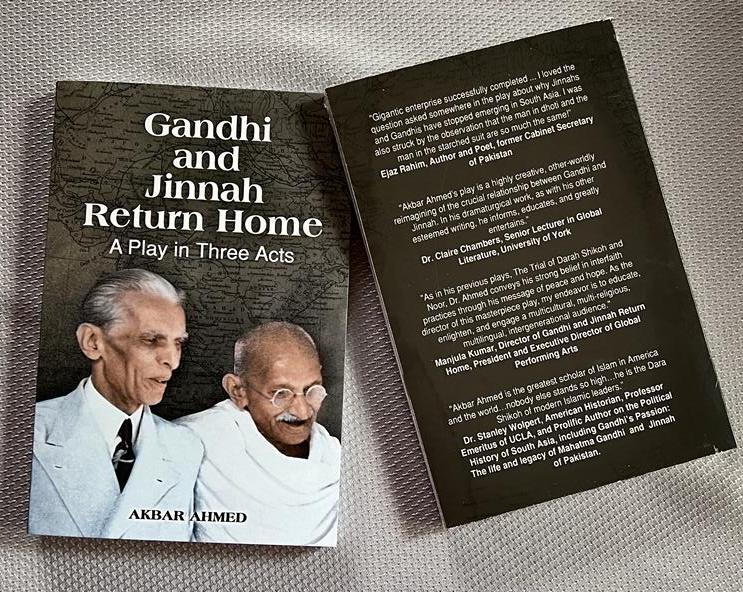
Dr Akbar Ahmed’s video presentation at the Mahatma Gandhi seminar in Bangalore, India
Gandhi’s Message for India-Pakistan Reconciliation
By Dr Akbar Ahmed
American University
Washington, DC

The 21 st centuryappears to present a very gloomy picture, at least to the great thinkers of our time. From Bernard-Henri Levy to Yuval Noah Harari to John Mearsheimer to Henry Kissinger, they point to the devastation brought by climate change, the potential dangers of Artificial Intelligence, and the widespread political violence emerging out of ethnic and religious conflicts. Looming over the misery of ordinary lives is what Mearsheimer, a leading American political scientist, calls “great power rivalry,” when the individual is further forgotten and dominated by the vast resources and political power of the hegemonic nations. On top of all this — or because of it — commentators suggest we may be sleepwalking into a third world war, one that may well end human life as we know it on the planet. It is in this context that Mahatma Gandhi’s compassion and commitment to peace and humanism are more relevant than ever. Not only his ideas, but also his life example have a message that is timeless.
In order to alleviate the widespread gloom and misery the world desperately needs universal philosophies to embrace the diverse sections and shapes of human societies. Gandhi’s idea of ahimsa (nonviolence), shanti (peace) and seva (service) to people – and, of course, satyagraha (non-violent struggle for justice) ─ are the most powerful messengers of a philosophy relevant for every part of today’s world.

Ambassador Akbar Ahmed delivers his keynote address at the 155 th birthday anniversary of Mahatma Gandhi at the Gandhi Memorial Center in Washington on October 2, 2024. A memorable evening, the Gandhi Jayanti was celebrated with songs and sayings of Mahatma Gandhi on nonviolence, love, and kindness
As a Muslim and a Pakistani, what appeals to me the most is that these values are embodied in his reaching out to those not of his faith, particularly Muslims. This is what makes him a true saint. He went out of his way to show respect for and acceptance of the religious minorities. For example, he wrote the foreword to the life of the Prophet of Islam, read from the Holy Qur’an in his morning prayers, and chanted his favorite hymn which included Ishwar and Allah, the Hindu and Muslim names for God, who is one and the same for all.
Here Is how he praised the Prophet of Islam: “I wanted to know the best of the life of one (Muhammad) who holds today an undisputed sway over the hearts of millions of mankind. I became more than ever convinced that it was not the sword that won a place for Islam in those days in the scheme of life. It was the rigid simplicity, the utter self-effacement of the Prophet the scrupulous regard for

L to r: Srimati Karuna Director of the Gandhi Center, Ambassador Akbar Ahmed keynote speaker, Ambassador Tim Lenderking US Amb to Yemen, Manjula Kumar director of the play and movie ‘Gandhi and Jinnah Return Home’, and AmbassadorNicholas Burch State Dept
pledges, his intense devotion to his friends and followers, his intrepidity, his fearlessness, his absolute trust in God and in his own mission. These and not the sword carried everything before them and surmounted every obstacle.”

Songs at Gandhi Center, Washington
The Mahatma showed once again his inclusive embrace of humanity when, even after the bloody and bitter Partition of India in 1947, he declared that he would spend three months of every year in Pakistan as for him the peoples of both nations were close to his heart. At his daily prayer meeting on 26 January 1948, four days before his assassination at the hands of Nathuram Godse, a Hindu extremist, he spoke about the need to preserve brotherly relations between India and Pakistan. “Before leaving this topic of the day, let us permit ourselves to hope that though geographically and politically India is divided in two, at heart we shall be friends and brothers helping and respecting one another and be one for the outside world.”

Mahatama Gandhi’s Birthday celebration with religious songs
It is not generally known that the response of Mohammad Ali Jinnah, the Father of Pakistan, was equally magnanimous. He ordered his staff that full protocol be provided for the Mahatma as given to a head of state. Perhaps it is because of his genuine efforts to promote friendship between India and Pakistan despite Partition that Gandhi was assassinated. But that is precisely what in my eyes and the eyes of millions makes him a super-hero for the ages.
When Jinnah heard the Mahatma was assassinated, he issued an immediate message of condolences. He used the word ‘great’ four times to describe the Mahatma, adding the Muslims of India had lost their greatest supporter.
The Mahatma presents us with the great modern Indian paradox – the nation which was given Gandhi’s brilliant vision at birth has so carelessly and senselessly abandoned it, with the ongoing brutal persecution of minorities, violence against women and other injustices. And what a vision he had: If a true aristocrat is to be defined by courtesy and good manners, then the Mahatma was no less than the most refined princes and maharajas of India. His respect and courtesy towards his adversaries even in times of acrimony and division were legendary. For example, Jinnah was his political opponent. Yet, he respectfully addressed him as Quaid-i-Azam (Great Leader), the title given to Jinnah by his supporters.
What are the principles of Gandhian behavior we need to remind ourselves of? What are we to extract from a life so rich in its dedication to the eternal human values? Despite the shameful attacks on his reputation online these days, what we need to share and propagate are the great Gandhian virtues of ahimsa, shanti, seva and his deep respect for all religions. Not only India, but the entire world needs these Gandhian values.
Both Gandhi and Jinnah would have been heartbroken to see the condition and predicament of the minorities in their respective nations. Anyone who reads Jinnah’s Constituent Assembly speech of 11 August 1947 would be left with no doubt that he too believed in peace, harmony, and pluralism. He wanted non-Muslims in Pakistan to have the same rights as Muslims. He envisioned Pakistan and India living as peaceful and friendly neighbors. To my mind the reconciliation of these two great men of history is the inevitable destiny of the subcontinent and will bring peace and harmony to this vast and troubled region of the planet.
That is why, my latest play “Gandhi and Jinnah Return Home” ends with the last scene of the two giants of the subcontinent embracing and acknowledging each other. I wrote this play because I have grandchildren and I want them to live in peace. My contemporaries and I grew up listening to our elders talk about the horrors of partition in 1947. They grieved those who died while crossing the newly formed border in the largest mass migration in human history. Sadly, o ur South Asian subcontinent in the last century elevated the Mahatma to an icon and then forgot his true message. We have to, all of us, revive the essence of his message for the 21 st century. He does not need us; we need him.
(Akbar Ahmed is Distinguished Professor of Islamic Studies at American University, Washington DC. He is an ardent promoter of inter-faith dialogue. He was Pakistan’s former High Commissioner to the UK and Ireland. This article is based on his speech at the international seminar on ‘Mahatma Gandhi for the 21 st Century’, organized in Bengaluru in August to commemorate the 75 th anniversary of the Gandhi Smarak Nidhi.)

Book cover: Gandhi and Jinnah Return Home (Pakistan Link Publications, 2023)

